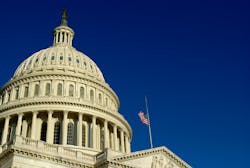War of words in Congress over oil and gas lobbying and climate change
Democrats on the House Oversight and Reform Committee spent more than 5 hours rhetorically beating up on top oil and gas executives Oct. 28 as the lawmakers complained of industry lobbying on climate change and what they saw as inadequate investments in alternative energy sources.
The Democrats characterized much of the lobbying as “disinformation” that slowed Congress from advancing legislation to address climate change, and they asked the executives to denounce various past statements by their own companies or the American Petroleum Institute (API).
The targets of the denunciations were Exxon Mobil Corp. Chief Executive Officer Darren Woods, Chevron Corp. Chief Executive Officer Michael Wirth, BP America Inc. Chief Executive Officer David Lawler, Shell Oil Co. President Gretchen Watkins, API President Mike Sommers, and US Chamber of Commerce Chief Executive Officer Suzanne Clark.
Rep. Carolyn Maloney (D-NY), chairman of the committee, set the tone from the start by saying she wanted oil and gas executives to admit “their central role in bringing the planet to the brink of catastrophe.”
Maloney and Rep. Ro Khanna (D-Calif.) made frequent references to tobacco industry executives who decades ago denied that tobacco and nicotine were addictive, the repeated implication being that oil executives operate in the same manner.
Rep. Alexandria Ocasio-Cortez cited various forecasts for future catastrophe from climate change and lamented “the future that you all are setting on fire,” her rhetoric similar to Khanna’s reference to “a burning world.”
Under fire
Answering by video connection from corporate offices, the executives insisted their companies do not lie and that their statements have evolved over time as scientific knowledge about climate change has evolved. The CEOs admitted occasionally disagreeing with API on one issue or another but refused to slap down the association for its lobbying.
Instead, the executives stressed positive aspects of their industry. They said their companies provide the energy needed for producing food, clothing, and countless petrochemical products such as masks worn because of the COVID-19 pandemic. They stressed gas heat for homes and energy for the full array of economic activity that makes modern life possible in the US and other countries.
Without oil and gas, Woods testified, “our current standard of living would not be possible.”
The executives stuck to mild, noncombative remarks even as activists such as Rashida Tlaib (D-Mich.) raised the emotional level with broadside denunciations.
Khanna wanted pledges of annual reductions in oil output from the Exxon and Chevron executives. Woods and Wirth would have none of it.
Rep. Jim Cooper (D-Tenn.) wanted the executives to total up the subsidies they receive, but no such totals were offered, and one executive said gasoline and diesel are taxed, not subsidized. Cooper also asked for a price to be put on carbon, but executives said it would vary over time and location as market prices for commodities do.
Party split
Republicans on the committee stressed the need for reliable energy and good-paying jobs in the oil and gas sector, and they decried what they saw as an effort to “demonize” the people who provide the energy.
Rep. Jim Jordan (R-Ohio) described it as “the dumbest thing” that Democrats were asking oil companies to reduce production while the Biden administration asks the Organization of the Petroleum Exporting Countries to increase production.
Other Republicans stressed the value of the energy producers to the US economy and Americans’ lives and used questions to allow executives to defend their industry.
API’s Sommers said US emissions of greenhouse gases are 12.6% of world emissions and going down. China’s emissions are 32.6% of global emissions and going up, Sommers said.
He added that if use of natural gas for electric power generation is reduced, a serious risk is that utilities will return to burning higher levels of coal for generation.
About the Author
Alan Kovski
Washington Correspondent
Alan Kovski worked as OGJ's Washington Correspondent from 2019 through 2023.
